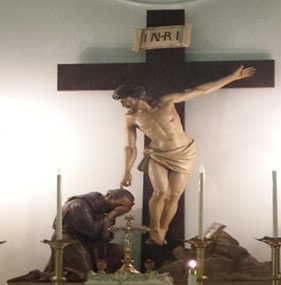“The end of a melody is not its goal"Throughout the year, the Southern New England Conference of the United Church of Christ produces the Daily Lectionary for use by churches. These are the suggested readings for Friday, March 12th: Psalm 107:1-3, 17-22; Daniel 12:5-13; and Ephesians 1:7-14. I would encourage you to read these short selections as part of your Lenten practice.
Today is our fourth Lenten Friday. Lent is a time to prepare ourselves to approach the cross humbly and lovingly, and Lenten Fridays accentuate the discipline of this spiritual journey. There are many redemption theologies based on the cross of Christ, but in today’s Ephesians reading we encounter one that I find especially meaningful. I remember when Mel Gibson’s Passion of the Christ movie was first released. I chose to not watch because to separate Jesus’ death from His life is to distort its meaning. It misrepresents the cross as distinct from the lived gospel of Jesus. The philosopher Friedrich Nietzsche once wrote: “The end of a melody is not its goal: but nonetheless, had the melody not reached its end, it would not have reached its goal either.” The death of Jesus is the climactic conclusion of the life of Jesus. It is as meaningful to separate the cross from Jesus’ life as it is to read the last lines of a novel and imagine that they make sense. Today’s Ephesians passage unites Jesus’ Incarnation, His life, with the cross. The biblical phrase that aroused Christian thought was “gather up all things in [Christ].” The outstanding Greek verb was άνακεφαλαιώσις (anakephalaiosis) in 3:10. The passage reads: “With all wisdom and insight [God] has made known to us the mystery of his will, according to his good pleasure that he set forth in Christ, as a plan for the fullness of time, to gather up all things in him, things in heaven and things on earth.” This is called the recapitulation view of atonement. In this theology of our salvation, Christ is seen as the new Adam who succeeds where Adam failed. He recapitulates, He re-states, God’s act of creation. Christ undoes the wrong that Adam did and because of His union with humanity Jesus gathers up “all things in him, things in heaven and things on earth,” and unites them with God. In the Adam story, creation is separated from the Creator. In Jesus there is an overriding re-creation that gathers up all creation once again and reunites it with God. Jesus’ Incarnation, the Son of God emptying Himself of His divinity (Philippians 2:5-8) and taking on the fullness of human nature, re-sanctifies all of creation. The cross is not the goal of Jesus’ life, in the imagery of Nietzsche, but it is the final statement of Jesus’ life, and without it Jesus’ life would not have reached its goal, the goal of gathering up all creation in Him. On this fourth Lenten Friday, I hope that this ancient idea of the recapitulation of all things (τά πάντα, ta panta) in Christ gives us each fertile ground for meditation. It is a magnificently hope-filled theology that in the “fullness of time” (πληρώματος τών καιρών, pleromatos ton kairon) all creation will be restored to its rightful place in union with its Creator. And the cross stands as the culmination of Jesus’ saving life. If you’d like, here is the link to the Massachusetts Conference’s daily reading schedule: www.macucc.org/lectionary.
0 Comments
Leave a Reply. |
NewsFaith, love and chitchat. Categories
All
Archives
June 2024
Follow
|
|
SERVICE TIMES
Sunday 9:30-10:30am Children Sunday School 9:30-10:30am Nursery care available during worship DONATE Make a single or recurring contribution by clicking here |
FOLLOW
|

 RSS Feed
RSS Feed
